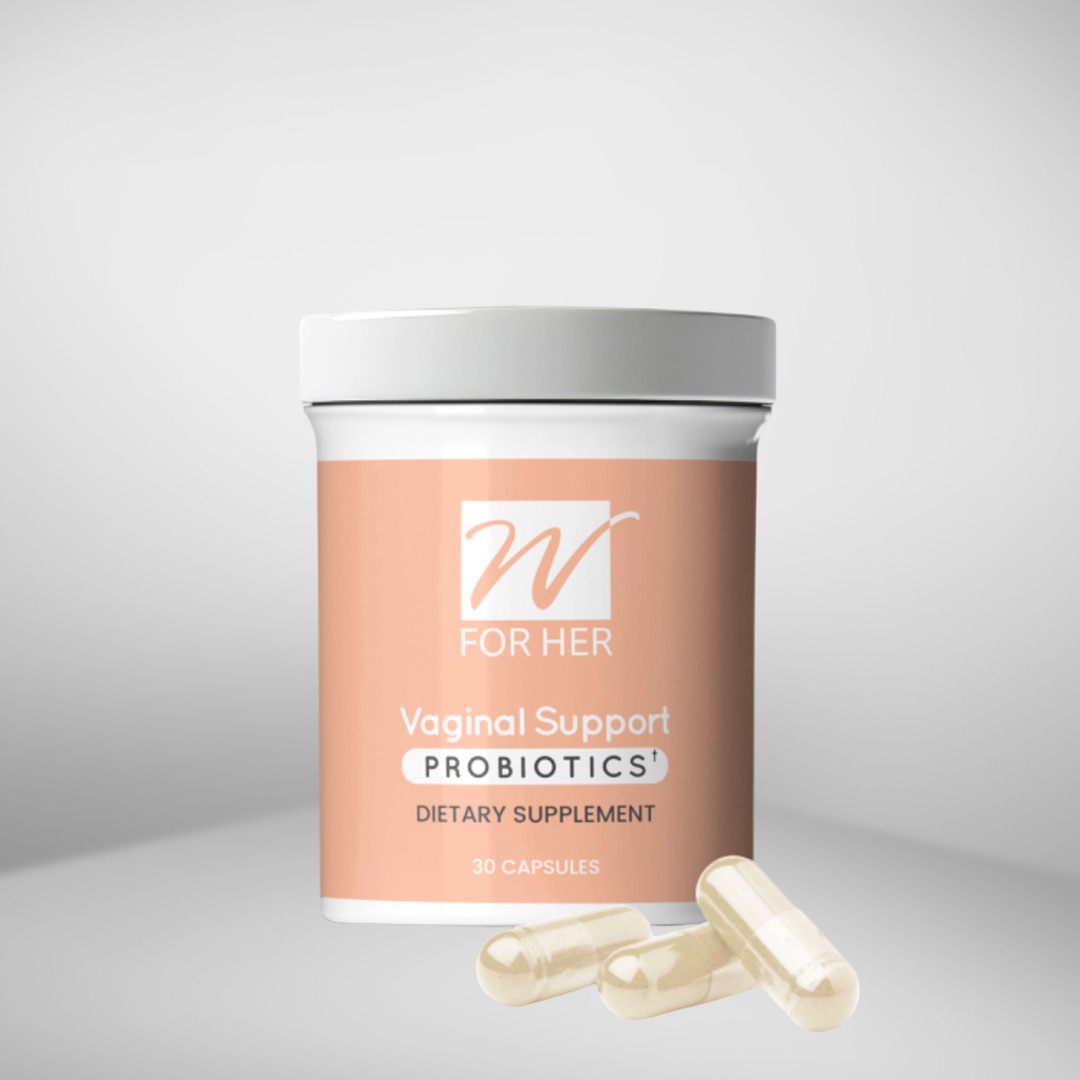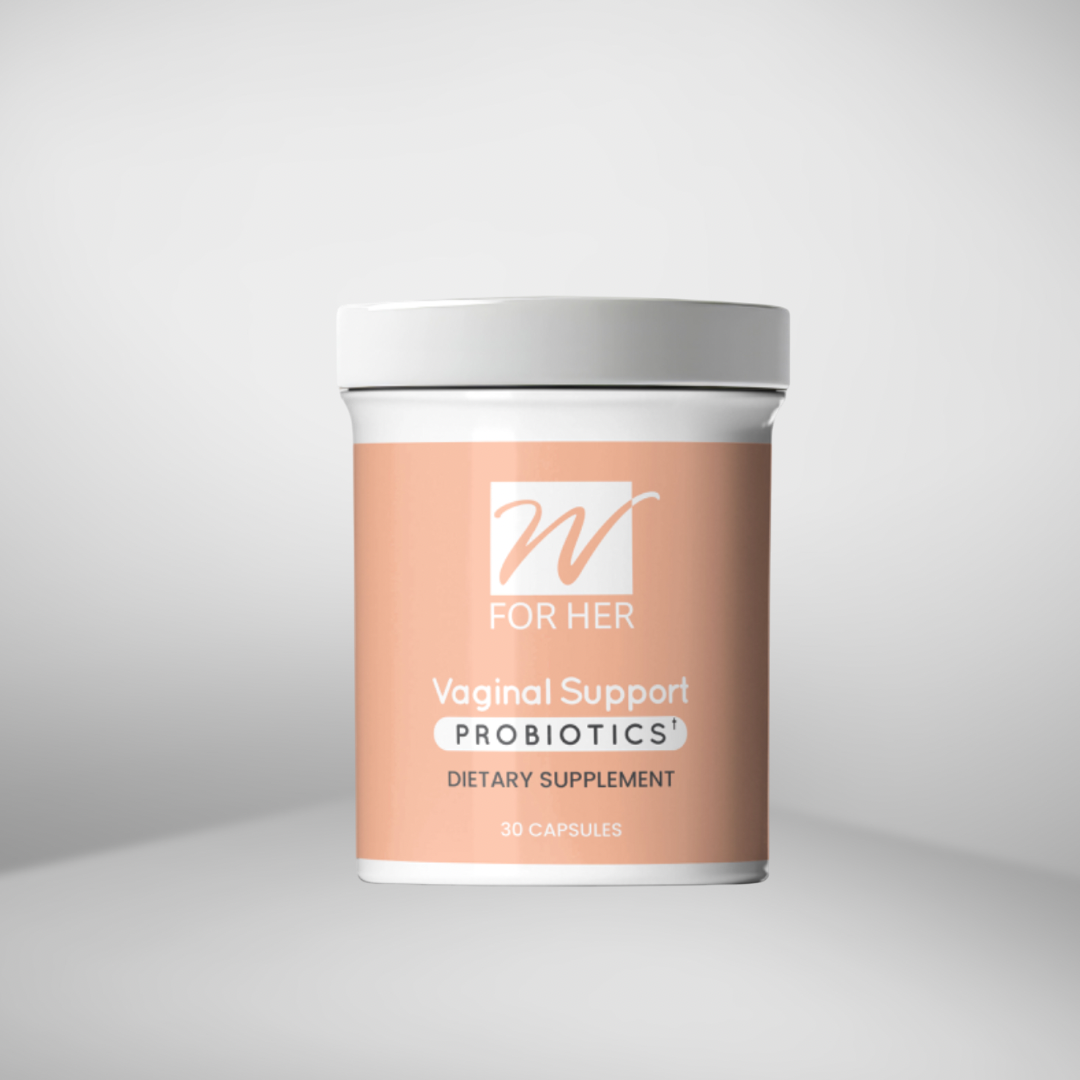Promoting Vaginal Health from the Inside Out
Microbiome research is an evolving area of medicine providing medical science much insight into overall human health and wellness. While some microorganisms are responsible for infections and disease, others support core body functions, including digestion and reproductive health.


The Vaginal Microbiome
The vaginal microbiome—the bacteria, fungi, flora, and microbiota—is incredibly complex. Imbalances can lead to yeast infections and vaginitis and have been linked to infertility, pregnancy complications, sexually transmitted infections (STIs), and gynecological cancer.
While the field is nascent, there is mounting evidence to associate the presence of a healthy Lactobacillus bacteria population with positive vaginal health outcomes. Lactobacillus is generally seen as beneficial as it protects the vagina against harmful pathogens and bacterial overgrowth while maintaining a healthy internal pH level. Some studies also suggest that prophylactic supplementation with Lactobacillus may prevent the recurrence of chronic vaginosis while helping to maintain a healthy vaginal ecosystem.
Some conditions that may predispose women to bacterial infections include overuse of antibiotics, frequent douching, sexual frequency, previous pregnancies, and STIs. These variables, among others, can alter the vaginal microbiota and make women more susceptible to infection, infertility, and other reproductive complications.
Supplementing with Lactobacillus is a simple, drug-free way to restore balance to the vaginal microbiome. If you experience frequent vaginal infections or are looking for ways to support fertility or a healthy pregnancy, adding a Vaginal Support Probiotic may help to reduce complications and discomfort caused by infection. For those experiencing frequent or chronic vaginal infections, Vaginal Support Probiotics may help to break the cycle so you can get back to enjoying life.

What is the Vaginal Microbiome?
Microbial communities are found throughout our bodies, each with a specialized population of flora that plays a role in the systems where they thrive. There is a great deal of discussion and research in scientific circles about the gut microbiome and how it supports our overall health, but what about the vaginal microbiome?
Much like the flora found in your gut, those that live in your vagina have a specific role to play. Beneficial vaginal microorganisms are the first line of defense in preventing more harmful species of bacteria from taking hold and causing health issues. The “good” bacteria fight unwanted invaders by competing with them or producing antimicrobial flora, inhibiting bacterial overgrowth.
The right bacteria must be present in sufficient numbers for this process to be efficient. Growing evidence supports the role of supplementation in maintaining a healthy vaginal flora, but we must also be aware of what might be causing imbalances.
The predominant strains of beneficial bacteria found in the vaginal microbiome are mostly Lactobacillus, which make up about 95% of the population. Individual species include:
- Lactobacillus reuteri
- Lactobacillus acidophilus
- Lactobacillus paracasei
- Lactobacillus rhamnosus
- Lactobacillus gasseri
- Lactobacillus crispatus
- Lactobacillus jensenii
- Lactobacillus iners
Not all strains above will be present in the vagina, as some prefer to live in the gut. As with most things in life, balance is the key to good health. Given the proper support, our bodies are exceptionally good at finding that balance. With that in mind, there are some caveats.
Are Vaginal Probiotics Safe for Everyone?
While vaginal probiotics are generally considered safe, there are a few conditions that may become worse by adding more Lactobacilli into the mix.
Women with excessive amounts of Lactobacilli in their system should avoid supplementing with more. Conditions like cytolytic vaginosis (CV) cause Lactobacillus overgrowth, and adding more could exacerbate symptoms, which can include a burning sensation during urination, vaginal discharge, itching, burning, or painful intercourse. Risk factors for CV include pregnancy, perimenopause, and diabetes mellitus.
If you are considering vaginal probiotics to address chronic bacterial infection or other concerning symptoms, speak to your gynecologist first to ensure it’s safe for you to do so. Confirm the source of your discomfort so your good intentions don’t make it worse.

What Causes Vaginal Microbiome Imbalance?
Factors (some of which may be within your control) that may cause the vaginal microbiome to become unbalanced include:
- Frequent douching
- Frequent unprotected sexual activity
- Chronic antibiotic use
- Poor intimate hygiene
- Tight or synthetic (does not breathe) underwear
- Laundry products (fabric softener, detergents)
- High-stress lifestyle
- Smoking
- Frequent sauna, swimming, or hot tub use
- Menopause, menstruation, pregnancy
- Some medications (birth control, HRT, IUDs, intravaginal medications)
The above factors may significantly decrease lactic bacteria production, altering microbial species diversity in the vagina and opening the doors for harmful microbes to dominate.
Unfortunately, when this happens, you will feel it. Vaginal discomfort, itching, irritation, discharge, and infections may occur. If symptoms are chronic or persistent, it’s a clear sign that your vaginal microbiota is out of balance.
If you see your doctor with any of these concerns, ask to be tested for specific types of bacteria so you can ensure the treatment addresses the cause. In cases where the symptoms are severe, you may still need to take antibiotics to resolve the issue. Starting a course of vaginal probiotics along with your antibiotic treatment may help you recover faster, while ongoing supplementation may reduce the incidence of recurrence.
Vaginal Support Probiotics: What’s Inside?
WforHer Vaginal Support Probiotics are the product of much research and testing to ensure safety, efficacy, and bioavailability. Our formulation focuses on three specific strains of probiotics, each with strong scientific evidence to support its benefits to vaginal health.
1
Lactobacillus Acidophilus LA-14
Lactobacillus acidophilus is one of the most popular and well-known probiotics due to its highly efficient mechanisms. When
Research into the acidophilus LA-14 strain of Lactobacillus has highlighted excellent results for women’s health when paired with Lactobacillus rhamnosus HN001. Studies show that this combination enhances the diversity of healthy gut bacteria, reduces inflammation, and plays a role in preventing bacterial vaginal infections and UTIs. This particular strain of Lactobacillus may also be helpful in treating drug-resistant infections.
Additional studies conclude that Lactobacillus acidophilus LA-14 improves bone mineral density in post-menopausal women and enhances immune response.
Though Lactobacillus acidophilus is generally safe, we recommend consulting your GP if you take antibiotics or sulfa-based drugs. Some studies indicate that supplementation with Lactobacillus acidophilus may increase the rate of sulfasalazine metabolization, which is sometimes used to treat ulcerative colitis.
Additionally, some antibiotics may render Lactobacillus acidophilus useless if taken too close together. Ideally, wait at least two hours after a dose of antibiotics to consume L. acidophilus.
2
Bifidobacterium Lactis HN019
Bifidobacterium is a lactic acid-producing bacteria that has also been highlighted in studies as playing a significant role in supporting a healthy vaginal microbiome. Best known for its ability to support digestive function and maintain overall gut health, Bifidobacterium lactis HN019 has many benefits, including supporting oral health, maintaining regularity, and as an immune system modulator.
B. lactis HN019 is also known to ease constipation, nausea, and gas that often accompanies pregnancy. These common conditions frequently lead to fatigue and poor energy, which directly impact the gut microbiome and may impede the growth and efficiency of bacterial populations.
B. lactis is well-tolerated and is considered safe for children and pregnant women, although some may experience gas from taking probiotics. Consult your GP if you have concerns.
3
Lactobacillus rhamnosus HN001
L. rhamnosus HN001 has frequently been studied in combination with B. lactis HN019 and L. acidophilus LA-14. It has been clinically trialed in pregnant and breastfeeding women to address conditions that include gestational diabetes, prenatal benefits to the unborn child, post-natal depression, and in women’s vaginal health.
L. rhamnosus HN001’s application in pregnancy is especially meaningful as many women experience increased incidence of vaginal infections, like candida, and other pregnancy complications, including premature births. Maintaining a healthy vaginal microbiome during pregnancy is vital as the mother passes her flora on to the infant. There is also evidence to suggest that post-natal depression impacts breast milk quality and may also be passed on to the child.
Research supports that all women supplementing with L. rhamnosus can expect benefits that include improved vaginal microbiome diversity and protection from bacterial and aerobic vaginosis, UTIs, and candida infections.
One Capsule Daily: A Simple Way to Love Your Body
Vaginal Support Probiotics contain ingredients proven to support and optimize vaginal health. There are so many ways our bodies can become stressed. For women, the result is often uncomfortable, manifesting as frequent UTIs, vaginal infections, and a lot of time and energy spent on trying to reduce symptoms.
Unfortunately, many don’t visit a doctor until the symptoms become excruciating. Antibiotics may help the first time it happens, but they also decrease vaginal flora diversity, which may lead to subsequent infections that are even harder to treat.
Women experiencing chronic UTIs or bacterial infections may feel frustrated, ashamed, or even desperate to find a solution. If you see yourself in that statement, you need to know that treatments do not always equal a cure. You need a more holistic approach to get to the root causes of your issues, ease your symptoms, and finally get some relief.
But don’t assume our Vaginal Support Probiotics are only for women experiencing the complaints we described above! Prevention is, after all, the catalyst for a life well-lived.


Our women’s probiotics are designed to support your healthy lifestyle and improve your vaginal microbiome through all life stages, through child-bearing years and beyond.
WforHer Vaginal Support Probiotics’ formulation is based on many years of science, research, and testing, ensuring the product you purchase is safe, effective, and highly bioavailable to ensure you get maximum value for your purchase.
Browse our FAQ below, and don’t hesitate to reach out if you need to know more. We are committed to your health and providing evidence-based products you can feel confident will deliver the benefits they promise.
Frequently Asked Questions
WforHer Vaginal Support Probiotics are formulated to support vaginal health, promoting healthy vaginal flora and protecting your reproductive system from harmful bacteria overgrowth. Women who experience frequent UTIs or vaginal infections may benefit from supplementing with Vaginal Support Probiotics through symptom reduction and fewer infections.
WforHer Vaginal Support Probiotics are conveniently formulated for once-daily dosing, taken with or without food.
Our Vaginal Support Probiotics undergo rigorous testing under strict FDA guidelines for purity and safety. The ingredients, L. acidophilus LA-14, L. rhamnosus HN001, and B. lactis HN019, are widely understood to be safe for all adult women. Scroll to the individual ingredient information on this page to learn more. Before beginning any course of supplementation, we recommend you consult with your medical practitioner to ensure Vaginal Support Probiotics are right for you.
Yes! WforHer Vaginal Support Probiotics are formulated to be taken daily. Long-term benefits are best achieved when the dosage is consistent. However, should you choose to discontinue, you will not experience any adverse effects as a result.
As every body is unique, we recommend consulting with your OB-GYN to ensure Vaginal Support Probiotics are right for you.
Vaginal Support Probiotics are available exclusively online at Amazon.com. Visit our website to learn more about our products and access a direct link to make a purchase.
Our products contain no known allergens, dairy, gluten, or animal products. The active ingredients are combined with indigestible dietary fiber (meaning the molecules do not penetrate the intestinal wall) and certified safe by the FDA.
Our products contain no known allergens, dairy, gluten, or animal products. The active ingredients are combined with indigestible dietary fiber (meaning the molecules do not penetrate the intestinal wall) and certified safe by the FDA.
Do you have questions about WforHer Vaginal Support Probiotics that are not answered here?
Get in touch! We’re always here to provide the information you need to make informed choices for yourself and your body.

